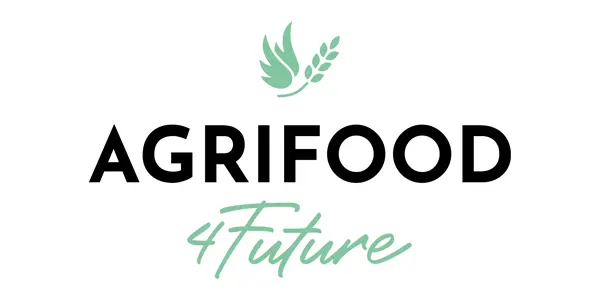Sister Projects
Agrifood4Future
Sister Project
AgriFood4Future
AgriFood4Future aims to develop vocational training skills and educational programmes that meet the needs of the “agriculture of the future”. This mission can be divided into 3 operational objectives:
- AgriFood4Future will contribute to the transformation of the agri-food sector towards digitalisation, decarbonisation and sustainability.
- AgriFood4Future will support the large-scale implementation of new and emerging agriculture practices, such as climate-smart agriculture, precision agriculture, regenerative and organic practices.
- AgriFood4Future will provide the necessary soft and technical skills, raising awareness, and cultivating an entrepreneurial mind-set for the “agriculture of the future” for young people and workers in the agri-food sector.
These objectives will be achieved through the various stages of the project. Firstly, an assessment of skills requirements and preparatory work will be carried out. This will be followed by cooperation and networking between the partners, with the aim of creating lasting partnerships. The aim of these partnerships will be to develop innovative education and training programmes in the field of intelligent agriculture and sustainable food systems. Finally, the partners will prepare an action plan to ensure the sustainability of the project.
Formations Agricoles Agrivoltaisme Numérique – FAAN
Sister Project
FAAN Project – Agricultural Training in Agrivoltaics and Digital Technologies
The FAAN project (Formation Agricole Agrivoltaïsme Numérique) brings together 22 partners – ranging from training institutions, research centers, and companies to regional authorities and agricultural innovation networks – to support the agricultural sector’s transition toward the “third agricultural revolution,” shaped by digital, robotic, and energy transformations.
FAAN aims to address skill shortages and low job attractiveness in the agricultural sector. The project focuses on building vocational and academic training pathways , developing immersive learning tools, creating a regional online training platform for agricultural technologies, and running on-farm pedagogical experiments.
As a partner in FAAN, IFV is involved in the development of short training courses on new agricultural technologies, immersive systems, and experimental teaching projects on agricultural school farms.
FAAN is an innovative and transferable model, designed to stimulate sustainability, technology adoption and the attractiveness of agricultural employment in all regions.
FOOD CHASE
Sister Project
Food Chase – Food Supply-Chain Ecosystems for Sustainability
Food Chase is a project co-funded by the Erasmus+ programme involving partners from seven countries.
It is designed around the objectives of the EU Farm to Fork Strategy and aims to address skills mismatches across the entire food supply chain.
The project develops targeted solutions, a competence framework and introduces an innovative professional profile at EQF Level 5, specifically designed to bridge the gap between current labour market needs and the available workforce.
IPR4SC
Sister Project
IPR4SC – targets the lack of intellectual property informatics and management skills, i.e. ‘IP for business’ skills, that are enriched with green, digital and entrepreneurial skills. Their lack can present a barrier to successfully engage in the new (digitally enabled) transitions towards more sustainability and circularity, whilst achieving economic growth.
The general aim of the project is to increase the innovation capacity of EU inventors, trained in HE and VET organizations, in designing and implementing sustainable and circular economy businesses by boosting IP for business skills.
The project will develop educational offerings to be delivered by the HEI and VET providers that are adapted to the various target groups, include the use of open resources, and support putting IP for business into practice.
LCA CARE
Sister Project
LCA CARE – Collect, Analyse, Report and Evolve for eco-innovative SMEs
The LCA CARE project aims to support eco-innovative SMEs in the agri-food sector by developing an innovative tool and training resources to improve their ecological impact.
The project will create and test the LCA CARE tool, a cloud-based application for SMEs to perform Life Cycle Assessment (LCA) and provide capacity-building for companies and education providers on LCA methodologies.
The goal is to help SMEs optimize the environmental impact of their products and promote eco-innovation. A consortium of 12 organizations from Portugal, Bulgaria, Germany, Lithuania and Spain will design a post-graduate training program for SME managers and offer courses on LCA and eco-innovation.
The project will also organize national and international events to raise awareness and engage SMEs, education providers, students and professionals in LCA and sustainability.
MULTIFUNCTIONALITY FARMING – MY FARM
Sister Project
MYFARM project deals with the topic of multifunctionality, and this topic is linked at the same time to several European strategies. In each partner country a Multifunctionality National Developing Centre will be established as an online hub in order to implement the different activities of our project.
Through NUTS analysis and the guidelines provided it will be possible to better understand how to design the “Multifunctionality Technician” professional figure and the training programmes in terms of skills and contents. Fostering new, innovative and multidisciplinary approaches to teaching and learning, with the active collaboration of educators and trainers across Europe, will merge in the creation of new learning, teaching and training activities.
The multistakeholder involvement of different organizations, combined with their extended network, will provide a brand-new point of view on the market requirements in terms of new skills and future trends in the sector.
Oper8
Sister Project
The Oper8 project involves 8 operational groups from 7 European countries, working or having worked on the development of alternative weed control solutions. The operational groups include farming organizations, technical institutes, and research centers.
The project aims to generate significant impact and enhance the sustainability of the European agricultural sector. The 7 partner countries are located in Mediterranean, Atlantic, and Northern regions, representing a range of production systems.
The project focuses on identifying and understanding the issues and challenges of alternative weeding practices, fostering a strong European network around this topic, and promoting dissemination and knowledge transfer activities, and production of several types of technical documents and audio-visual materials.
This project has received funding from the European Union’s Horizon Europe programme under grant agreement No. 101060591.







